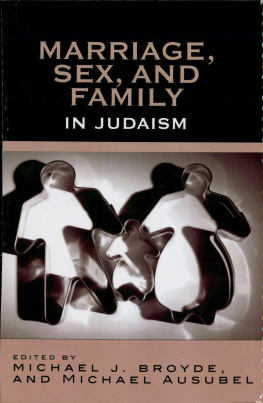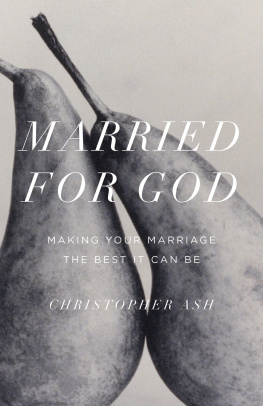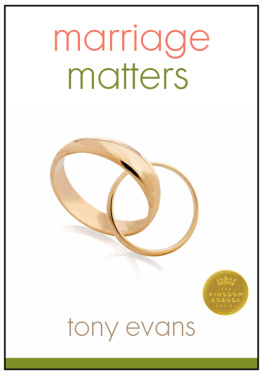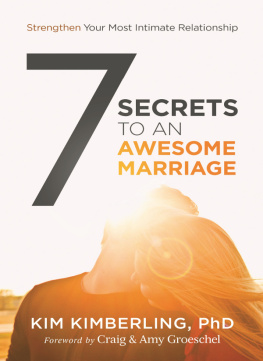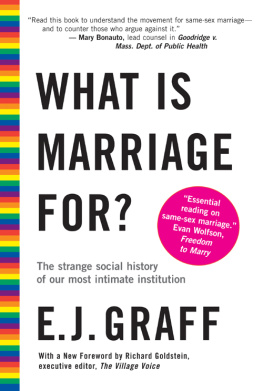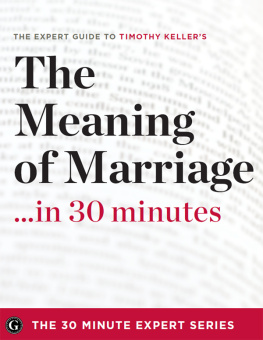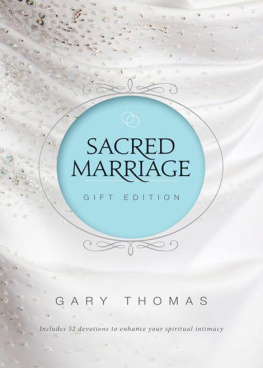Marriage Matters
Marriage Matters
Perspectives on the Private and Public Importance of Marriage
Janice Shaw Crouse
First published 2012 by Transaction Publishers
Published 2017 by Routledge
2 Park Square, Milton Park, Abingdon, Oxon OX14 4RN
711 Third Avenue, New York, NY 10017, USA
Routledge is an imprint of the Taylor & Francis Group, an informa business
Copyright 2012 by Concerned Women for America, Washington, D.C.
All rights reserved. No part of this book may be reprinted or reproduced or utilised in any form or by any electronic, mechanical, or other means, now known or hereafter invented, including photocopying and recording, or in any information storage or retrieval system, without permission in writing from the publishers.
Notice:
Product or corporate names may be trademarks or registered trademarks, and are used only for identification and explanation without intent to infringe.
Library of Congress Catalog Number: 2011022101
Library of Congress Cataloging-in-Publication Data
Crouse, Janice Shaw.
Marriage matters : perspectives on the private and public importance of marriage / Janice Shaw Crouse.
p. cm.
Includes index.
ISBN 978-1-4128-4607-3
1. Marriage. 2. MarriageSocial aspects. I. Title.
HQ519.C76 2012
173dc23
2011022101
ISBN 13: 978-1-4128-6317-9 (pbk)
ISBN 13: 978-1-4128-4607-3 (hbk)
This book is dedicated to
Gilbert L. Crouse Sr.
my husbandthe love of my life.
Together we have forged a strong and happy marriage
that mattersto us and to our children:
Jack and Charmaine Crouse Yoest
and
Gilbert Jr. and Naomi Liles Crouse
and to our grandchildren:
Hannah, John, Helena, Sarah, and James Yoest
Gilbert Lewis Crouse III (Lewis)
and Charles Mark Crouse
Contents
I want to express my deep appreciation to my mother, the Reverend Ruth Baird Shaw, who modeled the sacredness of marriage, the sacrificial love of a parent, the generous spirit of service and exemplifies what it means to be a ladyaccomplished, well-educated, wise, warm, and gracious. At eighty-eight, mothers award-winning blog is read by thousands; her latest book comes out the summer of 2012.
I also want to express appreciation to the memory of my father, the Reverend Charles C. Shaw, who loved me unconditionally, would have given his life for me, believed in me, supported my every effort and taught me to recognize and respect integrity and authenticity in a man. A veteran of WWII, he was truly a member of the Greatest Generation and to his seven children he was a great daddy!
I want to thank my associates at Concerned Women for America who provided their skills, talents, and insights to enrich the messages of this bookBrenda Zurita, Lauren Levy, Hannah Swanson, Rebekah Tooley, and Kristin Dowd.
I especially want to thank my husband, Gilbert L. Crouse Sr. whose editing and insights contributed some magical lines in this book.
Two pure souls fused into one by an impassioned lovefriends, counselorsa mutual support and inspiration to each other amid lifes struggles, must know the highest human happiness;this is marriage, and this is the only cornerstone of an enduring home.
Elizabeth Cady Stanton (18151902)
The July 13, 2009 Time magazine cover story surveyed the matrimonial landscape and offered this summary of the ramifications of marital decline and deterioration: hardship, misery, and devastation to women and children, especially among the nations underclass. The author, Caitlin Flanagan, asked the question that is the basis for this book: How much does [marriage] matter? She answers her own question with a succinct sentence: More than words can say. Then, she continues with this assertion: There is no other single force causing as much measurable hardship and human misery in this country as the collapse of marriage. It hurts children, it reduces mothers financial security, and it has landed with particular devastation on those who can bear it least: the nations underclass.
On Valentines Day 2011, CNN began airing a freedom to marry campaign; this $10 million public education effort is designed to explain why marriage matters. The advertisements focus on concepts that are deliberately left nebulouslove, commitment, and familybut the unions it celebrates span the whole spectrum of possible couples. The end result, of course, is that when the possible arrangements included within the definition of marriage are expanded to include everything, it ends up meaning nothing. That is the very reason this book became necessaryat the same time that whole segments of society are dismissing marriage as unnecessary, other segments are campaigning to expand the definition of marriage. While determined special interest advocacy groups are trying to redefine marriage in ways that will make it that much less relevant, the media treats the public to a succession of high-profile infidelity scandals by public officials and celebrities.
Serious scholars and researchers face a tough task in trying to repair the damage to marriage, and counselors are left trying to restore the wrecked lives of women and children from the fallout in personal lives and in society as marriage has been undermined and declared unnecessary, irrelevant, and/or impossible. The result is a whirlpool of controversy surrounding the role and significance of marriageso much so that many people are left wondering who to believe in the cascade of opinions aired by a myriad of commentators and pundits. Whether denigrating marriage, trying to redefine it or working to strengthen marriage as an institution of civil society, the issue of marriage is still capable of becoming the cover story or making the headline above the fold.
Social science research has convinced the majority of them that marriage matters; demographic data makes the case that marriage matters. Common sense, accumulated wisdom, and shared experience agree: Marriage has far more impact on adults than most people acknowledge. Researchers indicate that married people have better health, longer and more productive lives, greater general happiness and better mental health than nonmarried individuals. Further, they also agree that marriage performs a critical function for society. Nothing harms children quite the way that not having married parents does. Flanagan summarizes, On every single significant outcome related to short-term well-being and long-term success, children from intact, two-parent families outperform those from single-parent households. She adds, Few things hamper a child as much as not having a father at home.
Marriage, then, is important because the family is the context within which the next generation establishes lifelong habits, and develops character. The child will learnto the degree that the childs family has the desirable characteristics and the childs family life prepares him or herto become a well-adjusted, productive adult who will contribute to the community and nation as a law-abiding and involved citizen. In this context, jurist Joseph Story wrote, Marriage is treated by all civilized societies as a peculiar and favored contract. It is in its origin a contract of natural law.


